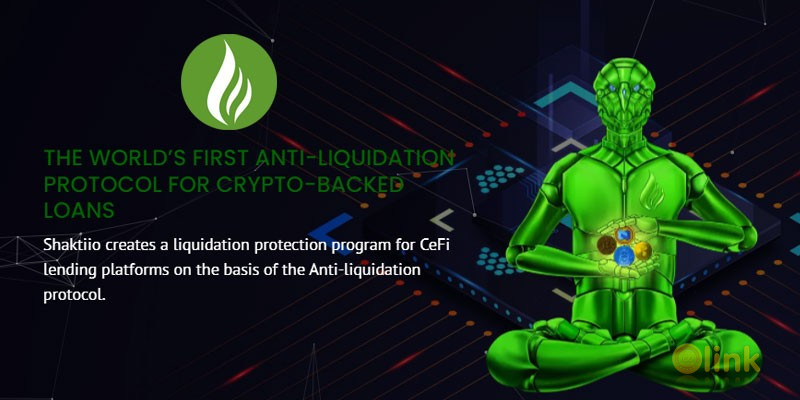Shaktiio: the Anti-Liquidation Protocol for Crypto-Backed Loans

PRESS RELEASE. Based on the Anti-liquidation protocol, Shaktiio develops a liquidation protection programme for CeFi lending platforms. The anti-liquidation protocol aids the stability of the bitcoin market by preventing it from being overextended. The expansion of the loan market and the extensive usage of trading instruments, including the use of leverage, has resulted in the imposition of massive amounts of collateral on banks and other financial institutions. In the event of a dramatic market decline, mass liquidations will rise and harm the market unless a method is developed and implemented to avoid mass liquidations in the event of speculative activities, mass sales, and market hysteria.
Anti-Liquidation – a Necessity for the Cryptocurrency Market
The cryptocurrency sector blends cutting-edge technology with cutting-edge ingenuity. This is where the most recent breakthroughs and new technology innovations are accessible. Nevertheless, due to the exponential growth and novelty of technology, there is a significant amount of fraud and manipulation on the market. As a result of the extensive use of leverage for speculation, massive sums of assets have been frozen and are now being used as collateral for loan platforms. When there is a significant decrease in the market, there are large liquidations of blocked assets and, as a result, mass sales, which cause prices to continue to fall further. However, not only do speculators who use leverage incur massive liquidations, but so do borrowers who take out personal loans secured by cryptocurrencies to meet their financial obligations.
Forced liquidation escalates the market’s collapse and lowers the values of cryptocurrencies due to a massive sell-off. Forced liquidation will not occur, though, due to the Anti-liquidation protocol Shaktiio. This suggests that the market will stay constant and that there will be no sales. In the event of a collapse in the cryptocurrency market, Shaktiio provides an Anti-liquidation system that ensures that cryptocurrencies that function as collateral for loans will not be traded and forcefully liquidated if their value falls below specified limitations or their debt.
Hence, whales will more challenging harder time manipulating the market if they use the CeFi platform’s liquidation mechanisms. Supply and demand, rather than whale speculation and manipulation, will be allowed to really determine the market’s faith and prices.
Besides, the Shaktiio ecosystem uses incentive schemes to recruit new users to the platform. SKTO holders will be rewarded for their participation in the network and ownership of SKTO via a unique incentive programme they have created just for its members. Reward systems are a means of promoting Shaktiio services throughout the globe as well as bringing in extra cash for ecosystem members. Adding a reward system to the Shaktiio environment will help it expand even quicker.
Shaktiio’s Prospects for the Future
The primary objective of Shaktiio is to secure the long-term development and expansion of the Shaktiio ecosystem. A SKTO token support programme has been developed to do this. It has been implemented utilising multiple mechanisms, including a reward programme, incentive awards for active users, and other programmes. Individuals from all around the globe may benefit from Shaktiio’s solutions, irrespective of their social and economic backgrounds, well-being, or level of education. As a result, Shaktiio has become a highly popular and democratic initiative that is open to everyone and helps to develop the ecosystem as well.
Furthermore, Shaktiio will actively promote the Anti-liquidation Protocol around the globe, therefore growing the project’s ecosystem and raising its value as a cryptocurrency token on cryptocurrency exchanges. The expertise of the Shaktiio team and its comprehension and experience of the market and its present difficulties will aid us in putting all of our ideas into action and implementing the Anti-Liquidation Protocol, which they hope will save lives.
Nonetheless, Shaktiio will not rest on its laurels, but will continue to develop and enhance the quality of the products that are part of the ecosystem to make the Anti-liquidation Protocol scalable and more comfortable facile to leverage, as well as to provide users with more flexible tariffs and working conditions while using the protocol. In essence, Shaktiio’s most distinguishing characteristic is their ability to maintain consistency and persevere in the pursuit of success.
Shaktiio’s ICO
Shaktiio adheres to the 100 % return policy established by the ICO participants. In three years, when the Shaktiio ecosystem has reached the requisite degree of growth and development, investors will be able to claim their ETH back as a return. Besides, a transaction charge in the amount of USD is included in the refund.
You may rest easy knowing that Shaktiio’s anti-liquidation technology will keep your cryptocurrencies safe if the value of your collateral falls below specified restrictions or your debts. The ICO start is projected on 01 March 2022, so stay connected with Shaktiio’s latest updates:
https://www.facebook.com/shaktiioadmin
https://t.me/+dkpepyXpEMBiYjZl
https://www.linkedin.com/in/shaktiio
This is a press release. Readers should do their own due diligence before taking any actions related to the promoted company or any of its affiliates or services. Bitcoin.com is not responsible, directly or indirectly, for any damage or loss caused or alleged to be caused by or in connection with the use of or reliance on any content, goods or services mentioned in the press release.



